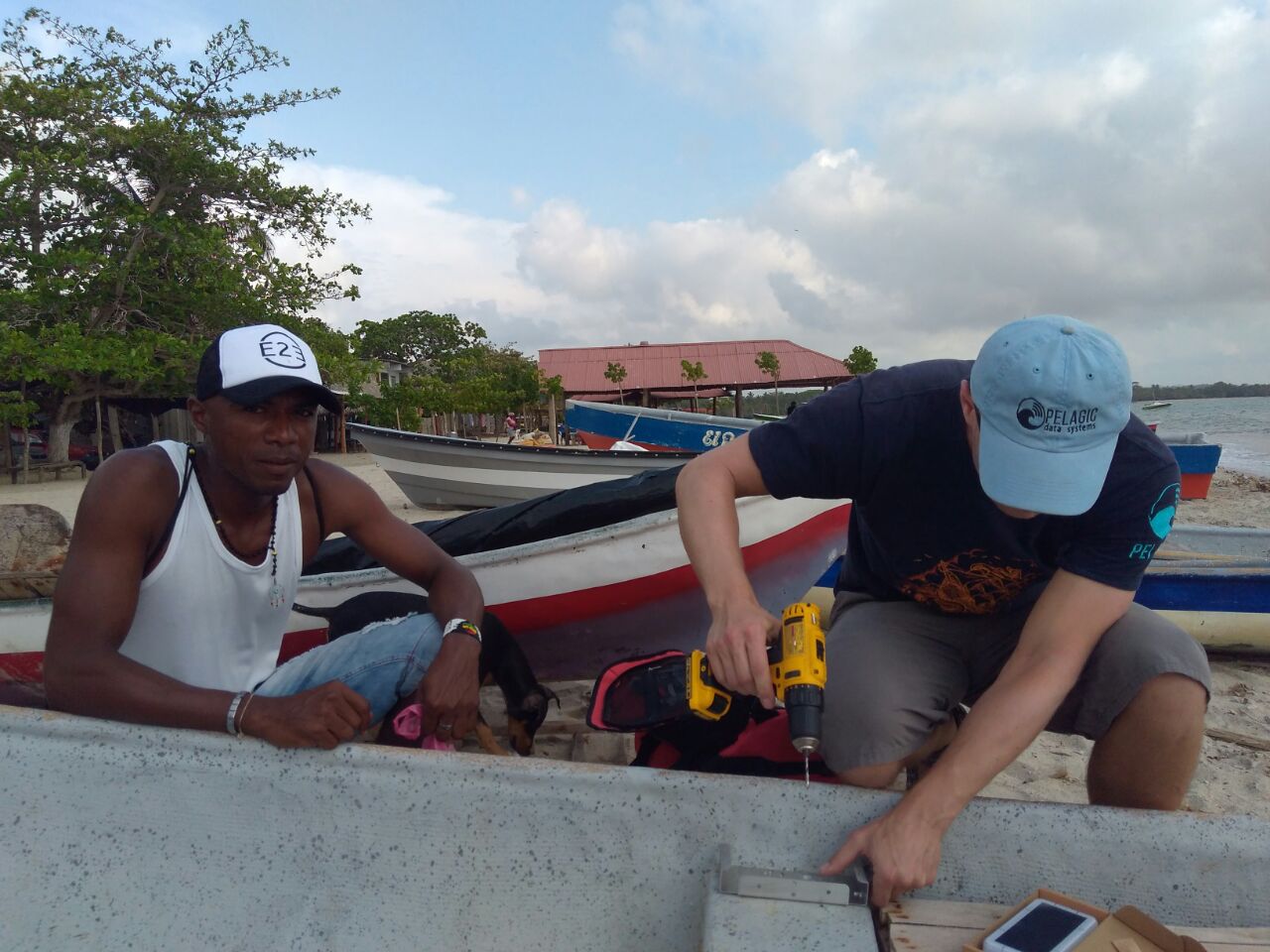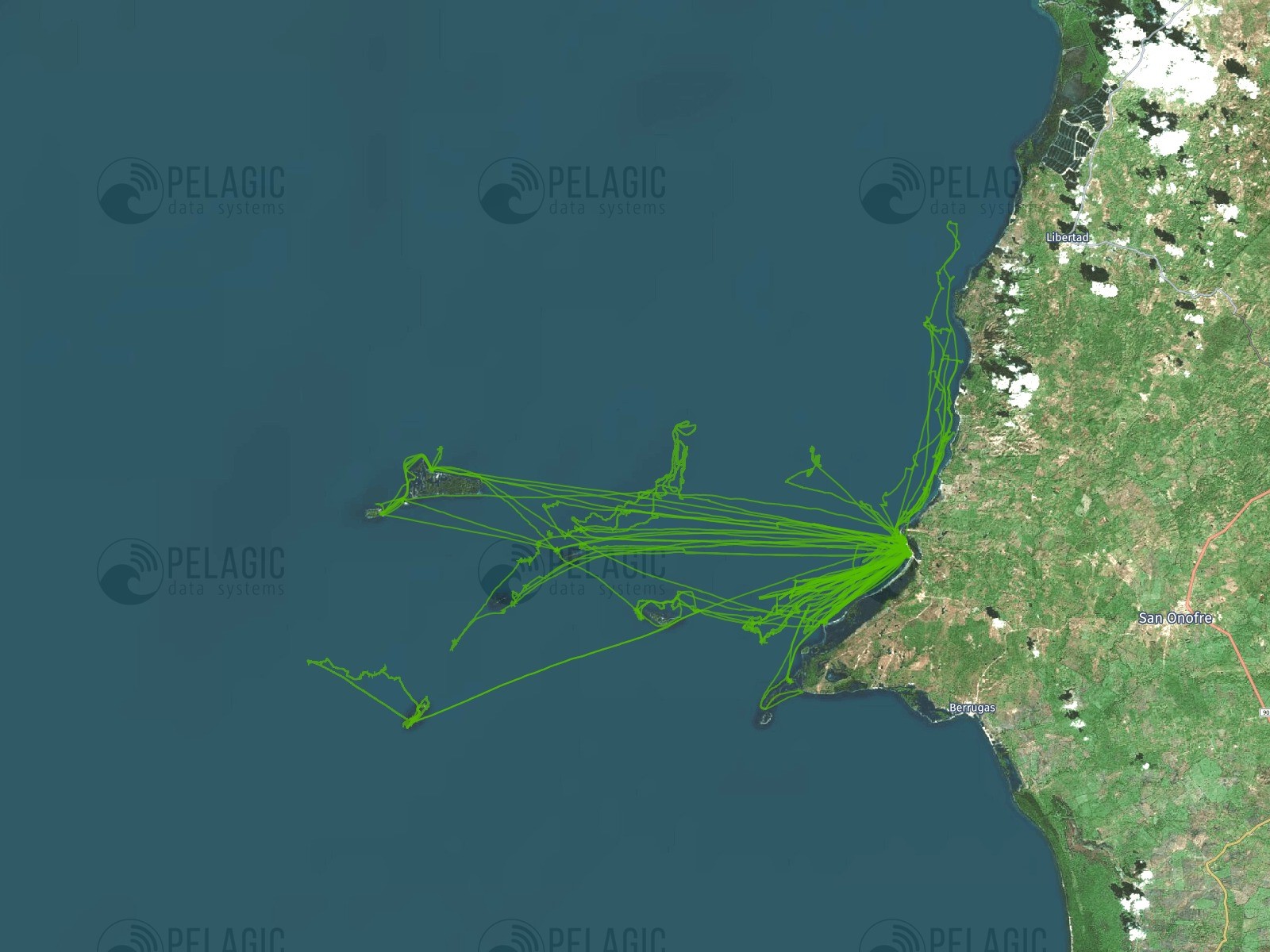Pelagic Data Systems and the E2E Foundation Partner to Improve Local Fisheries Management in Rincón del Mar, Sucre, Colombia
RINCÓN DEL MAR, Colombia (April 18, 2018)—The E2E Foundation and Pelagic Data Systems (PDS) have partnered with ASOPESAMRIN, the Fishermen´s Association of Rincón del Mar to install 32 vessel tracking devices to provide local fisherman with GPS tracking technology to monitor and improve their fishing practices.
From April 1-6, PDS´s Director of Field Operations, Daniel Suchomel, and the E2E Team in Rincón del Mar met with local fisherman to explain the benefits of PDS´s technology and to install them on their boats. The ultra-light vessel tracking systems continuously record vessel travel data, collecting an average of 600 data points per hour while the boats are fishing. These data points (essentially GPS coordinates) create a map of voyages for all tracked vessels. Using this voyage data, fisherman can monitor fleet activity, understand what kind of equipment fisherman are using and where. Instead of transmitting the stored data across expensive satellites, this efficient device transmits the data (after encryption) across the cell-phone network, which makes collecting and tracking data easy and inexpensive for fleets that manage small scale fisheries.
Anonymous sample data collected from the devices installed by Pelagic Data Systems in Rincón del Mar.
PDS´s fisheries management technology has arrived at a critical time in in Colombia. The Caribbean and Pacific Oceans account for 50% of Colombia´s territory[1], which hold a substantial amount of Colombia´s biodiversity. However, these invaluable aquatic ecosystems are under extreme threat due to issues such as climate change, pollution, coastal development and overfishing.
In an attempt to reduce these threats, the Colombian government has designated 35 Marine Protected Areas (MPA), all of which have different use restrictions for local communities.[2] The creation of MPAs in Colombia is largely a top-down, government-centered process that is lengthy, and minimally involves local communities who are most significantly impacted by MPA restrictions—and are most dependent on the marine resources extracted from their local fisheries.
There are an estimated 40,000 coastal villages on both Caribbean and Pacific coasts of Colombia, which have intense, daily socio-ecological relationships with the fisheries—the fisheries that the MPAs aim to protect[3]. For these efforts to be successful, local fisherman must be empowered to manage their own supply chains, fisheries and the preservation of this critical 50% of Colombia´s territory.
The devices installed by PDS and the E2E Foundation generate data for fisherman in Rincón del Mar that allow them to sustainably manage their fishery, thereby ensuring compliance with MPA rules as well as securing their future as a fishing community in economic, cultural and environmental terms.
Rafael Blanco, the President of ASOPESAMRIN, Rincón del Mar´s fisherman´s association said: “We have been waiting for a technology like this for a long time that will help us to manage our fleet better. With the new Marine Protected Area being discussed in front of Rincón del Mar, this technology will give us the information that we need to comply and maintain our fishing activities – which was one of our biggest worries with the new MPA rules”.
In an interview in 2017, Dave Solomon, CEO of Pelagic Data Systems said: “by gathering the right data and using it to make the right decisions, we can dramatically improve the health of our oceans and the wellbeing of those who depend on them”.
The partnership between PDS and the E2E Foundation was a response to the need to use data for conservation and sustainable coastal development – precisely what the E2E Foundation is doing in Rincón del Mar for mangrove protection through the project Manglar de Mi Corazón.
“The project Manglar de mi Corazón in Rincón del Mar uses mangrove carbon stock data as the basis for mangrove forest conservation; but we also use that data to provide community development projects as an incentive for the community to comply with mangrove forest conservation. However, coastal ecosystems are much more than just mangroves and the people that inhabit them—tropical dry forests and especially the coastal marine ecosystems are inextricably connected to mangroves. Now, between fisheries and mangrove forest data, we have a more clear picture of what is happening in Rincón del Mar and how to best manage not just one aspect of Rincón del Mar´s coastal ecosystem—but a large part of it. The most significant part is that for mangroves—and now the fishery-- data collection processes are being led by Rincón del Mar community members who organize the project, collect the data, understand it and make the decisions, and we give them the accompaniment that they need to do it along the way”.
This pilot project began in April 2018 in Rincón del Mar and has the potential to transform coastal management in Colombia.
We are all grateful to our partners at Schmidt Marine Technology Partners for their generous support of this work.
[1] Saavedra-Diaz, L.M., Rosenberg, A.A., & Martin-Lopez, B. (2015). Social perceptions of Colombian small-scale marine fisheries conflicts: Insights for management. Marine Policy 56, 61-70.
[2] Díaz, J.M. & A. Acero. (2003). Marine biodiversity in Colombia: achievements, status of knowledge, and challenges. Gayana, 67 (2), 261-274
[3] INVEMAR (2017). Colombia es 50% mar, aguas y costas que conservan 35 áreas marinas protegidas. http://www.invemar.org.co
ABOUT PELAGIC DATA SYSTEMS
Pelagic Data Systems (PDS) was founded in 2014 in San Francisco, California to bring a technologists’ approach to the ocean management space. They are setting the global standard for vessel tracking by bringing custom-made hardware, advanced data analytics, and expertise to fisheries world-wide. Its technology platform is designed from the ground-up to bring data insights to every fishing vessel in the world.
ABOUT THE E2E FOUNDATION
The E2E Foundation is a non-profit based in Medellín, Colombia, whose mission is to create mutually beneficial relationships between the Corporate and Developing worlds for sustainable development.
ABOUT SCHMIDT MARINE TECHNOLOGY PARTNERS
Schmidt Marine Technology Partners is a program of the Schmidt Family Foundation that supports the development of ocean technologies with compelling conservation and research applications, as well as strong commercialization potential.





